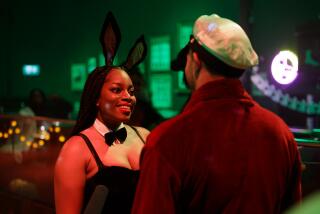‘QUEENIE’ AND THE NOVEL FACT OF OBERON’S FICTION
Merle Oberon, who died in 1979, was an extraordinarily beautiful actress, best remembered as Cathy in William Wyler’s classic “Wuthering Heights.”
But, says her one-time nephew Michael Korda, “her greatest achievement was not in her roles but herself, as Merle Oberon.”
Korda has just written a lurid page-turner called “Queenie,” which just happens to have been Oberon’s early nickname and, although fiction, is clearly inspired by certain events--and a key secret--in Oberon’s life. “Queenie” is chock-full of sensation, yet is a compassionate piece of writing by a man who also happens to be editor-in-chief of Simon & Schuster and a prolific columnist. To Korda, “Queenie” is above all about a woman who invents herself, and the price she paid as a result.
Korda tends to remember Oberon with more admiration than affection. “I found her a bit awesome and frightening. She was very difficult with children, although I always heard that she was wonderful with her adopted children. But when I was a child, children were of no interest or consequence to her.” That was mainly during World War II when the entire Korda clan--Sir Alexander Korda, Michael’s illustrious producer-director uncle and Oberon’s husband at the time; Vincent Korda, Michael’s distinguished art-director father, and Zoltan Korda, another uncle and eminent director--was in Hollywood exile.
“I remember being taken over to Alex and Merle’s house by my father,” said Korda, sitting in a Beverly Hills hotel suite. Trim and boyish-looking at 51, he has the direct, concentrated manner of a man used to making the most of his time.
“We sat in that beautiful living room in Bel-Air, and there was this huge box of chocolates. I reached for it and heard this voice from somewhere say, ‘Don’t touch it!’ After a while, I reached again--and again, ‘Don’t touch it!’ Finally, Vincent said to Alex, ‘Is Merle here? I thought she was at the studio.’ ‘Ah,’ said Alex, ‘that’s the bloody parrot! It listens to Merle all the time.’
“I’ve always thought that was some indication of what their marriage must have been like. The tragedy of it was that Alex had a deep, deep passion for Merle, but she didn’t return it, although she had considerable affection for him.
“After they were divorced, I didn’t see Merle for years, but sometime in the ‘50s my father, deciding that anybody was better than Alex’s new wife, ran into Merle at the Hotel du Cap and invited her to dinner with us. She was as beautiful as ever and insisted on sitting at a table where she could be seen. Then she said to me, ‘I don’t know if you remember, but when you were a little boy you broke one of my most expensive teacups.’ Extraordinary that over such a span of time, that was what she remembered best about me!
“She was in many ways an admirable woman, however, and a charming, witty hostess.”
Merle Oberon was also a woman with a secret that wasn’t revealed until after her death: that she wasn’t the well-bred Tasmania-born daughter of a British army officer she said she was, but was born a humble Bombay Anglo-Indian, a half-caste who because of the prejudices of her day was forced to conceal her mixed blood if she were to make her way in either show business or society.
“Although I understand and sympathize with Merle, the childhood she really had must have been infinitely more interesting than the one she invented,” Korda said. “It was exceedingly clever of Merle to pick Tasmania as her birthplace, but then she was an extremely intelligent woman--no one had ever been there, no one was likely to go there. That her father was a major was absolutely not true. I always called him ‘the vanishing major’--he was said to have died shortly before Merle was born. It’s possible, of course, but it does seem convenient.”
According to Korda, Oberon’s mixed ancestry was an open secret within his family. He says his father and his uncle Zoltan spoke of it, but never, “to his credit,” Alex, who discovered Oberon in London in the early ‘30s when she had just entered films, and was her husband from 1939 to 1945. As to why Oberon was never betrayed during her lifetime, Korda theorizes that “either the edifice that Merle created was of no interest to people, or was of such interest that they saw no point in tearing it down.”
However, when Korda wrote “Charmed Lives,” his irresistible and poignant 1979 family memoir, he says Oberon threatened to sue him. “It all boiled down to my stating her real name and stating that she was born in Bombay, so I shaded it. Still, she cut me out of her will-- if I was ever in it in the first place! I had assumed that enough water had passed under the bridge, but she still minded very much indeed about her past.
“With Alex, you always felt that behind the formidable--capable--facade somewhere laughing at himself was Sandor Kellner, from Pusztaturpaszto, Hungary, amazed that he had become Sir Alexander Korda. There was that slight suggestion that he was amused by what he had put over on the world. At night he was able to say, ‘Boy, I’ve come a long way.’ You had a sense that Merle was able to do the same thing--but with less amusement. ‘Queenie’ is what Merle ought to have been! I wanted the book to show that Queenie really always was still Queenie, no matter what. In any case, I don’t think Merle would have liked to see herself portrayed as Queenie, but for my money, Queenie was OK.
“I always thought Merle would have made a first-rate Scarlett O’Hara. Oh, I don’t know if she could have managed the accent, but she really had a lot more in common with Scarlett than Vivien did. I suspect that David and Myron Selznick knew Merle was Eurasian and thought that she was too risky a proposition to cast as Scarlett, of all people. But in fact I think she would have been splendid in the role.” (When “Queenie,” whose heroine does get to play a Scarlett carbon, becomes an ABC miniseries, Korda is hoping Jane Seymour will star.)
A man renowned for his sense of style and his books and columns on getting ahead, Korda says of himself, “I never did anything I thought I couldn’t do better, given a second chance.” He doesn’t see himself as having attained a high enough level of celebrity to invite serious envy, but adds: “I may be on my way.
“I’m determined to be the first person to be No. 1 on both the nonfiction and fiction best-seller lists in the New York Times. I already made No. 1 on the nonfiction list with ‘Power!’ ”
More to Read
Only good movies
Get the Indie Focus newsletter, Mark Olsen's weekly guide to the world of cinema.
You may occasionally receive promotional content from the Los Angeles Times.










